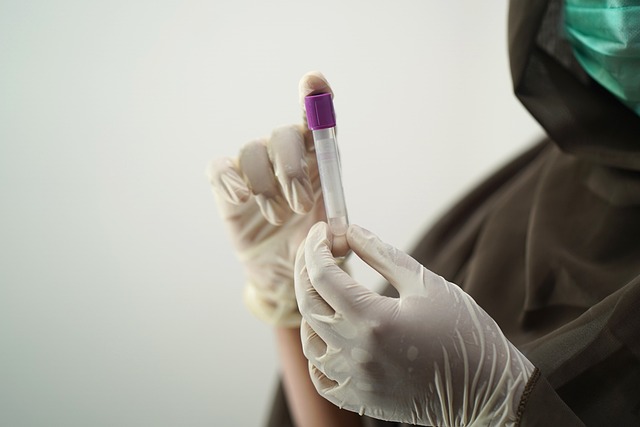The UK General Health Blood Test is a crucial health screening tool that provides detailed cholesterol profiles by measuring HDL (good) and LDL (bad) cholesterol levels along with triglycerides. This test is vital for early detection of cardiovascular disease risks, enabling personalized health advice from healthcare professionals. Fasting is necessary for accurate results, and the data obtained helps individuals understand their heart health and make informed lifestyle choices. The UK General Health Blood Test is a key element in the UK's preventive healthcare strategy, offering empirical evidence on an individual's cholesterol status and overall cardiovascular risk. It guides patients towards appropriate dietary changes, increased physical activity, and necessary medical interventions like statins if required. Regular testing supports long-term heart health management, with lifestyle modifications and medical treatments as recommended by healthcare providers. This comprehensive approach is integral to maintaining optimal cholesterol levels and reducing the likelihood of cardiovascular diseases within the UK population.
navigating the complexities of cardiovascular health, understanding cholesterol levels through the lens of the UK’s General Health Blood Test is pivotal. This article elucidates the critical role these tests play in early detection and management of potential heart health issues. By breaking down the components of ‘Decoding Your Numbers: The Role of Cholesterol Level Tests in the UK’s General Health Blood Test’, ‘Understanding Cholesterol: What to Expect from the UK General Health Blood Test’, and ‘Actionable Steps Post-Test: Managing Cholesterol Levels Based on Blood Test Results in the UK Context’, individuals can gain clarity on their cholesterol status and take informed steps towards healthier living. The UK General Health Blood Test serves as a vital tool for maintaining cardiovascular well-being, with personalized guidance to adapt lifestyle choices post-test.
- Decoding Your Numbers: The Role of Cholesterol Level Tests in the UK's General Health Blood Test
- Understanding Cholesterol: What to Expect from the UK General Health Blood Test
- Actionable Steps Post-Test: Managing Cholesterol Levels Based on Blood Test Results in the UK Context
Decoding Your Numbers: The Role of Cholesterol Level Tests in the UK's General Health Blood Test

In the UK, understanding one’s cholesterol levels is a pivotal aspect of maintaining general health and preventing cardiovascular diseases. The UK General Health Blood Test is a comprehensive panel that includes measurements of cholesterol types—high-density lipoprotein (HDL), low-density lipoprotein (LDL), and triglycerides. This test decodes your numbers by providing a detailed breakdown of the lipid profile, which is crucial for early disease detection and risk management. HDL, often referred to as ‘good cholesterol’, plays a vital role in reversing the buildup of plaque in your arteries, while LDL, or ‘bad cholesterol’, can lead to harmful deposits that increase the likelihood of heart attacks and strokes. The test results enable healthcare professionals to tailor personalized health advice and interventions, fostering a proactive approach to cardiovascular health within the UK population. Regular monitoring of these levels through the UK General Health Blood Test is integral for individuals to keep track of their cholesterol status, allowing for timely lifestyle or medical adjustments if necessary. This empirical data acts as a barometer for one’s heart health and overall well-being, underscoring the importance of this test in the broader context of the UK’s healthcare strategy.
Understanding Cholesterol: What to Expect from the UK General Health Blood Test

The UK General Health Blood Test plays a pivotal role in assessing an individual’s cholesterol levels, offering valuable insights into their cardiovascular health. Cholesterol is a waxy substance found in the bloodstream; it’s essential for many of your body’s functions but must be kept at optimal levels to prevent the development of heart disease and stroke. The test measures three main types of lipoproteins: low-density lipoprotein (LDL), commonly known as ‘bad cholesterol’; high-density lipoprotein (HDL), or ‘good cholesterol’; and triglycerides, which are a form of fat used for energy. LDL cholesterol, when present in high levels, can build up in your artery walls, leading to plaque formation and narrowing of the arteries, increasing the risk of heart attack or stroke. Conversely, HDL cholesterol helps remove excess cholesterol from your arteries and transport it back to the liver for disposal.
When preparing for a UK General Health Blood Test, it’s advisable to fast for at least 10 hours before the test to ensure accurate results. The test itself is straightforward; a healthcare professional will take a blood sample from a vein in your arm, typically from the inside of the elbow or the back of the hand. This sample is then analysed to determine your cholesterol levels and overall lipid profile. It’s crucial to discuss these results with your healthcare provider, who can interpret them within the context of your individual health needs and provide tailored advice on diet, exercise, and lifestyle changes that may be necessary to maintain healthy cholesterol levels. Regular monitoring through the UK General Health Blood Test is key to proactively managing your cholesterol and supporting your cardiovascular well-being.
Actionable Steps Post-Test: Managing Cholesterol Levels Based on Blood Test Results in the UK Context

Upon receiving your UK General Health Blood Test results, which include a comprehensive assessment of your cholesterol levels, it is crucial to take action in line with your healthcare provider’s recommendations. If your low-density lipoprotein (LDL) cholesterol, often referred to as ‘bad’ cholesterol, is high, your GP may suggest lifestyle modifications as a first step. This could involve adopting a heart-healthy diet rich in fruits, vegetables, whole grains, and lean proteins, while limiting saturated fats, trans fats, and added sugars. Regular exercise is another cornerstone of cholesterol management; adults should aim for at least 150 minutes of moderate aerobic activity each week.
For those with high cholesterol levels who require pharmacological intervention, your doctor will prescribe medication such as statins, which have been shown to be effective in the UK context. These medications work by inhibiting an enzyme that the body uses to make cholesterol, thereby reducing the amount of cholesterol in the blood. It is essential to take these medications exactly as directed and maintain regular follow-up appointments with your healthcare provider to monitor your cholesterol levels and overall health. Additionally, smoking cessation, moderating alcohol intake, and managing stress are also key components in managing cholesterol effectively within the UK population.
In conclusion, regular UK General Health Blood Tests serve as a pivotal tool in managing one’s cholesterol levels, offering insightful ‘numbers’ that guide preventive health measures. By understanding the components of cholesterol revealed through this test, individuals can take informed action to maintain heart health and overall wellbeing. Post-test consultations with healthcare professionals are crucial for interpreting results and implementing tailored management strategies within the UK context. These tests are not just a momentary health assessment but a step towards a proactive approach in safeguarding one’s cardiovascular health, reflecting the importance of this routine check in the broader scope of the UK’s general health monitoring system.
